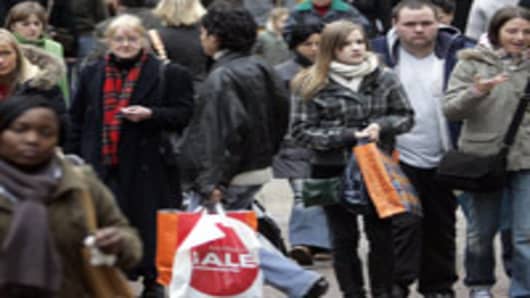The survey, which was distributed twice to respondents, once on Sept. 10 before the collapse of Lehman Brothers and American International Group , and again Sept. 18 after the financial crisis worsened and the administration unveiled its so-called bailout plan.
Nearly two in three respondents were both pessimistic about the economy today and optimistic about the economy for the future—a stark contrast to the 18 percent who felt similarly this summer. And, perhaps as an early endorsement that the government intervention will be the tonic to our national slowdown, it's a huge jump from the one-in-four who echoed that sentiment just two weeks ago.
The increase in optimism jives with a few more rays of sunshine in the economic gloom, with respondents expecting higher wages and home prices, along with less inflation.
While the Wall Street crisis is resonating on Main Street, it is still pain at the pump (and grocery store) that's on America's mind. Over half of respondents higlighted energy prices as the element of the economy most like likely to impact them over the next year. Stock market fluctuation was a considerably smaller concern, though it increased dramatically in the past two weeks (from 10 percent to 16 percent) with the vicious market swings.
Holiday Spending
As consumer America heads toward the vital holiday spending season, retailers could be in for trouble, the survey found. Respondents said they plan to spend almost 7 percent less this year, budgeting $781 per person for holiday shopping.
Election and the Economy
As the economy finds itself front and center on the campaign trail, the nomination of Gov. Sarah Palin could be just the help Sen. John McCain needs.
Between the two parties, America has considerably more confidence in the Democratic party when it comes its collective personal finances. And when asked which of the four presidential and vice presidential candidates is best suited to deal with the economy, Sen. Barack Obama won out over John McCain (36 percent to 27 percent). But, when Palin's advantage over Democratic vice presidential candidate Sen. Joseph Biden (12 percent to 5 percent) is factored in, it's a statistical wash between the two tickets.
While Democrats stand firmly by Obama, nearly one in four Republicans thinks Palin (not presidential candidate McCain) is the best candidate for the economy.
So, what should the next President focus on? While the Wall Street crisis is dominating the day, it is healthcare (26 percent) and energy prices (25 percent) that Americans want at the top of the next administration's agenda.
Dumping the Gas Guzzler
The quest for fuel efficiency is driving Americans to car dealers, the survey revealed. Almost one-in-four Americans is likely to purchase a more fuel efficient vehicle this year. The primary motivation being gas prices.
Starbucks Nation
If the contraction of Starbucks wasn't enough of a sign, $4 premium coffee just ain't selling the way it used to. The percentage of Americans who don't drink premium coffee at all jumped 11 percent this year, from 65 percent to 76 percent since February.


